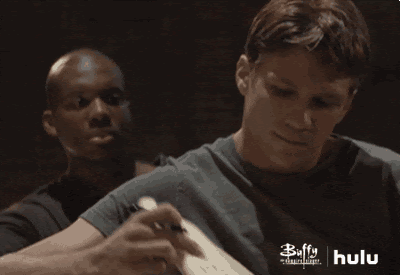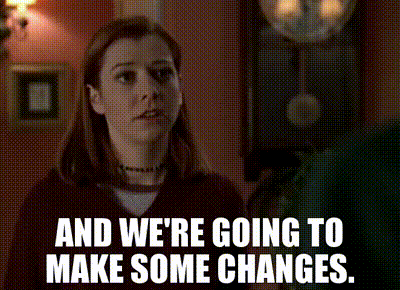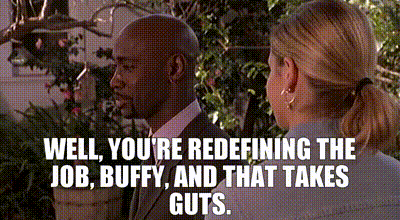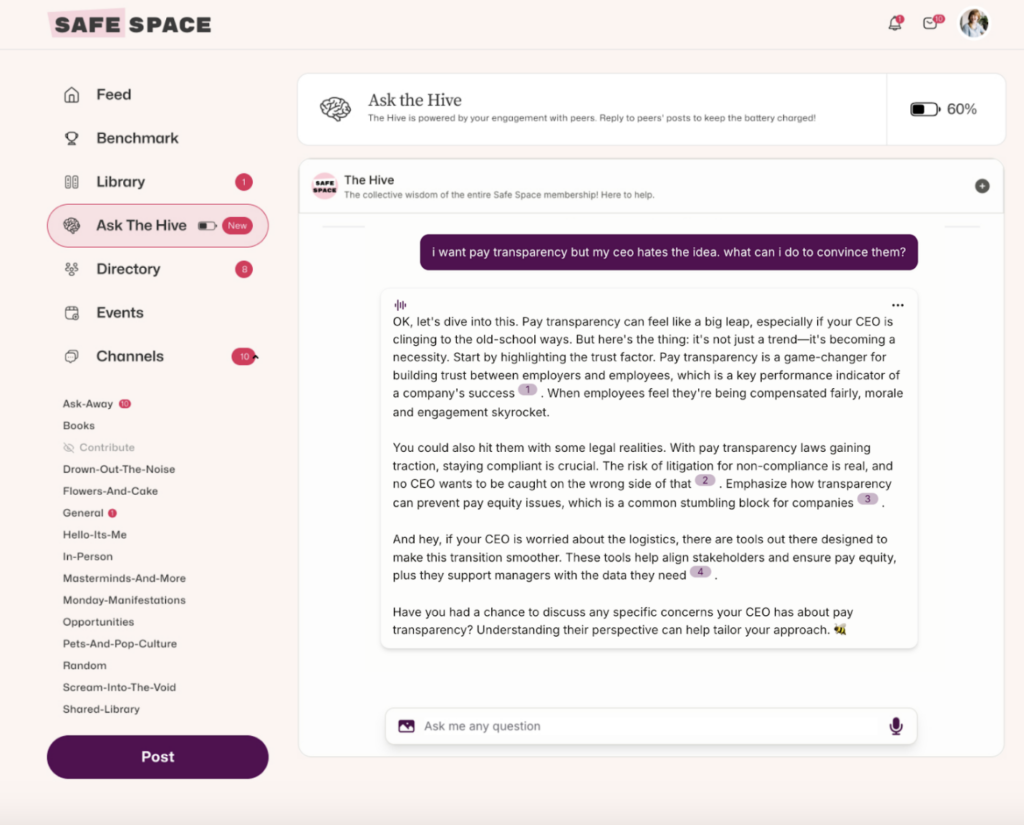5 Skills Every HR Person Needs to Master:

All this quarter I’ve been tackling the miseducation of HR (thank you Lauryn Hill for the inspo) and diving into HR role and leader profiles.
Something that a lot of leaders don’t understand about HR?
We are an interdisciplinary function.
Our work integrates methods, knowledge and perspectives from multiple fields.
HR draws from domains like:
✅ Business & strategy: things like setting goals, understanding financials and workforce planning fall into this bucket.
✅ Legal & compliance: we’re navigating new laws, considering legal precedent for our policies, and handling risk management.
✅ Data & analytics: we’re understanding and leveraging data to drive decisions,
✅ Sales & marketing: we’re extending offers, selling candidates to come work at an organization and establishing our employer brand in the market.
✅ Pyschology & behavioral science: things like working on employee experience, understanding motivations and different dynamics at work.
The blend of all these domains makes up an average day in HR.
What other organizational function can say the same?
Cough few cough.
I HAD to address this nuance before talking about what skills HR needs to master.
Because the list is vast and I could ONLY pick 5!!A history lesson:
Business Knowledge:

This first skill should come as no surprise to you!
JOIN 150K+ HR LEADERS
Get insights, learnings, and advice on how to build companies and cultures that people actually love.
No spam. Unsubscribe any time.
I’ve ranted, raved, and possibly shouted about how important it is that HR understand the business they are working in.
That means understanding things like the:
- Financials
- Strategy
- Industry trends
By understanding the business HR can better do things like:
- Align goals with the business strategy
- Effectively workforce plan
- Establish trust with the executive team
✏️ I have HOMEWORK for you!!
If you are struggling to understand your business here are a few questions you can ask:
- What are our primary revenue streams?
- What are the key business KPIs?
- What are some of the biggest cost drivers?
Pro-tip: forming a strong relationship with your finance folks is crucial for HR. This partnership is critical to help anticipate challenges and adjust work when needed.
Change Management:

Change management might be my newest FAVORITE thing to rant about.
Because it feels like HR has been navigating unprecedented times for 5+ years and this will probably be the case for the foreseeable future.
Plus it seems like a lot of business leaders actually struggle with change management.
Why? BECAUSE HUMANS DON’T LIKE CHANGE!
But effective change management can:
- Reduce confusion & resistance
- Increase adoption
- Maintain employee engagement
- Support productivity
There’s nothing worse than employees being confused and asking 5 times what they need to know. To me, that means someone has failed at change management.
🔑 The key to effective change management: proactive communication.
What’s that stat about how the average person needs to hear something 5-7ish times to make it stick?? That has been my guiding light when it comes to effective change management.
Communicating something 1-time ain’t gonna cut it.
For every change you make there should be multiple touchpoints about that change across multiple mediums.
📣 I’m sooo deeply passionate about this topic that next week I’m doing a whole newsletter on effective change management featuring my plans for you to steal. Stay tuned!!!
Employee Experience:

I was hesitant to put “employee experience” as a skill because it didn’t fit into the typical box of skills you hear about.
But, there’s nothing typical about this job so I decided it must be included.
📣 Employee experience isn’t a buzzword – it’s a business word (or it should be).
Because employee experience has a direct impact on:
- Recruiting top talent
- Retaining employees
- Productivity
- Engagement
- Innovation
- Revenue growth
- Customer experience
It turns out that if your employees are having a sh*t time a lot of things are impacted. WHO’DA THUNK?? (us, we thunk it)
The problem is that “employee experience” is a pretty wide category because it’s everything that could impact the experience the employee is having.
This is where employee journey mapping becomes incredibly important.
I fully believe in the power that is employee journey mapping. When I get to an organization it’s usually the first thing I do! I refer to my employee lifecycle regularly as I’m looking at goals to set, projects to take on and where we have opportunities to improve our experience.
✏️ Homework Assignment:
- Read this guide and this resource on employee journey mapping
- Map out your employee journey
- Establish priorities
- Focus on 1 high priority item to work on this next quarter
Refer back to your employee journey regularly – before you realize it you can add employee experience to your set of skills.
Coaching:

Growing up I was OBSESSED (still am actually) with sports movies.
I love a coaching montage. You know, the one where a new coach takes on a team, gives them tough feedback, helps them build good habits, and turns around the team to win the big championship. I was SO inspired by fictional coaches like Coach Bombay from Mighty Ducks, Coach Blitzer from Cool Runnings, and Coach Dugan from A League of Their Own.
I deeply believe in the power of a great coach to take teams to the next level.
But that greatness, it doesn’t come easily. Each of those coaches had their own struggle with the team.
HR is like a coach and our organizations are a team that might need course correction and tough feedback every now and then.
Coaching can:
- Help leaders develop
- Drive employee performance
- Enable manager effectiveness
- Support change management
- Support company culture
🧢 Ready to put on your coaching hat? Here are some question to leverage:
- What could be holding you back from achieving your goal?
- What strengths do you have that could help you handle this challenge?
- What is your ideal outcome in this situation?
- What is one small action you can take today to move forward?
- How can I best support you?
📖 Additional Reading:
Data Knowledge:

Data = my love language.
I’m like Jerry Maguire in that scene except I’m screaming “SHOW ME THE DATA”
All HR decisions should be guided by data. If you’re ever wondering, why are we doing this again? We’ve lost the plot.
HR leaders must be data driven because being data driven:
- Enhances our ability to effectively plan
- Proves HR’s value to the business (ugh, I know)
- Improves employee engagement
- Can help reduce bias across the org in things like hiring and promotions
- Can uncover things we may not know about the organization from just observation
🛠️3 Tips to develop data knowledge into a skill:
Learn HR metrics and how data is collected in your organization. A lot of HRIS have this functionality for HR data. FYI: Every tool you’re using is collecting data! Look across your tech stack and see if your tools have any sort of integration with one another to simplify data living in multiple places.
Develop storytelling skills. What story does the data you’re collecting tell? Leverage that story to gain influence and buy-in with your leaders. Never just present numbers – present WHAT the numbers are telling you.
Use data to test and iterate on HR programs. Track your metrics over time as you introduce new things to employees to learn of their effectiveness. If something proves to not work you have the data to pivot seamlessly.
What’s next:

That is just a list of 5 skills – but the list is potentially endless.
I bet you every HR leader has a different list of the top 5 but these are mine!
Maybe, a take away could be to ask others you know what they would list as the top 5 skills HR needs to master??
ANYWAYS, I mentioned in an earlier section that next week’s edition is all about change management.
I found myself writing a NOVEL in that section and thought to myself this deserves its own newsletter.
Next week, we’re gonna learn about ch-ch-ch–ch-change management.


